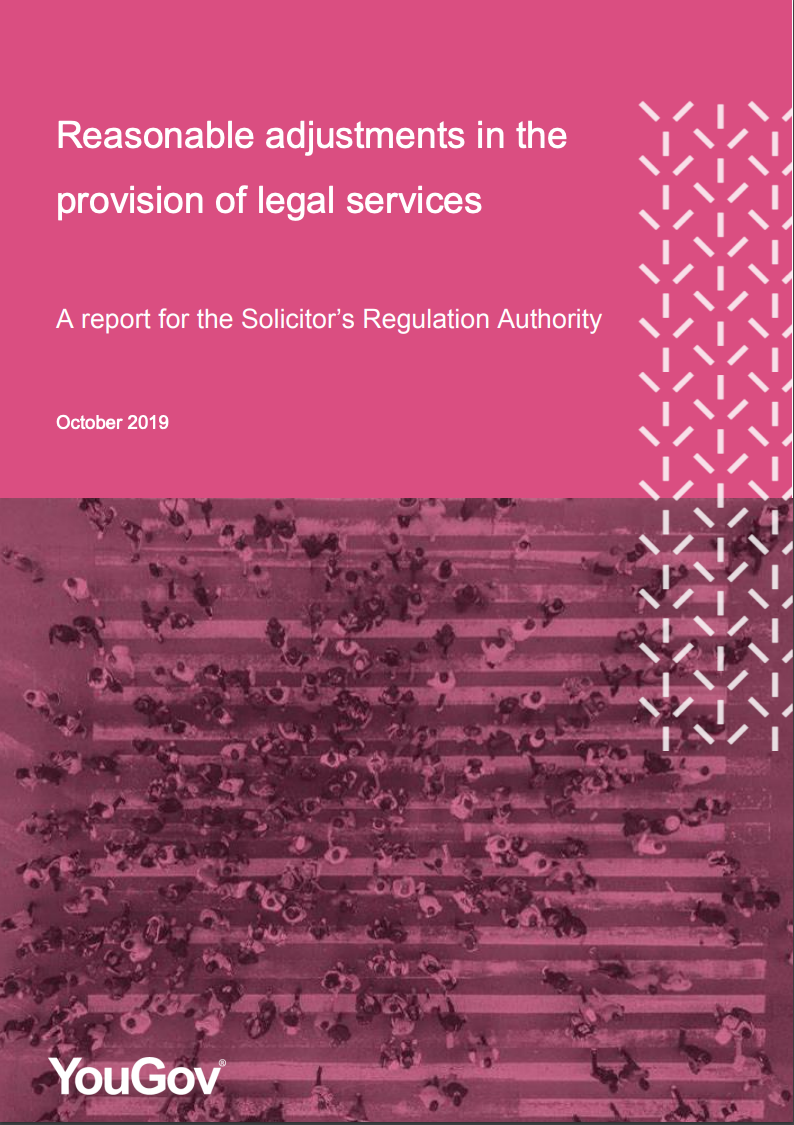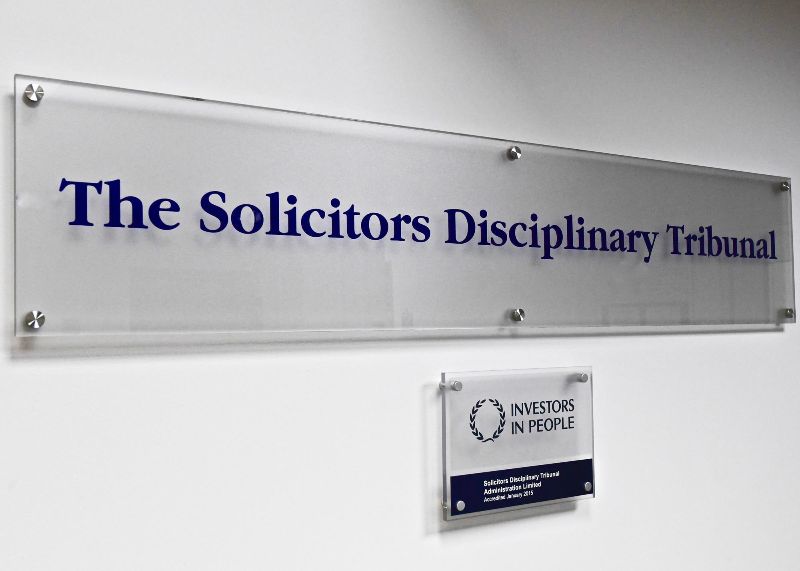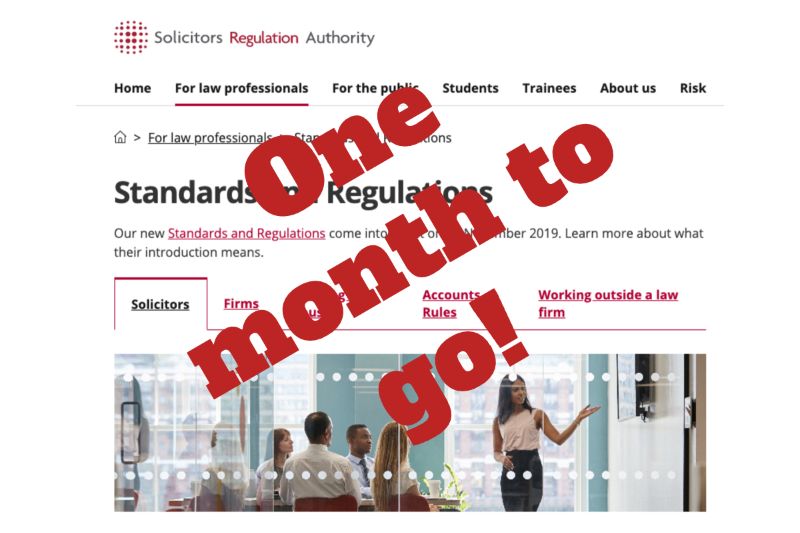SRA Standards and Regulations launching 25 November
However…
There’s no need to panic
However, the simple fact is that the biggest change to the new rules is in format, rather than substance.
Regulators often become seduced by particular models of regulation. For all its faults, principles-based regulation (eschewing prescription for flexibility and individual accountability), is the SRA’s chosen model.
The outgoing Handbook, based on both ‘outcomes’ and principles, was a radical change from previous versions. 2011 was a time of huge uncertainty – particularly with the introduction of COLPs and COFAs.
But it always looked like a work-in-progress, as if the regulator had run out of time. Not long after the 2011 Handbook was launched, there was talk of how the next version would be slimmed down.
Standards and Regulations is the logical next chapter. It is an evolution of the model, and probably looks much closer to what the 2011 Handbook was intended to be. At last we have Accounts Rules that can be understood by the people who are bound by them. And we can say good riddance to those nasty Indicative Behaviours in the Code of Conduct – those rules-but-not-really.
The new rulebook is not perfect, of course. There are a few peculiarities and concerns, for example around reporting duties and supervision. The SRA’s essential guidance is unstructured and piecemeal. And I would guess that at least half of the people would prefer a move back to black-and-white rules. That day will almost certainly come (perhaps with the next wave of senior management change at the SRA) – these things tend to be circular.
But for now, Standards and Regulations is what we’ve got to work with. And it could be a lot worse.
Log in to your e-Learning account (JBL clients only)

Is being a COFA too risky?
This has been the dilemma of every would-be compliance officer since 2013. On the face of it, being accountable for protecting client money could be a savvy career move – especially so if the firm has no other willing candidates.
But, as a wise arachnid/human once said, with great power comes great responsibility.
The COFA is an important regulatory role. Perhaps arguably more important than their COLP counterpart, given that firms are more likely to get into serious trouble over client account matters than anything else. That, and the fact that firms can process millions through the client account every single day.
The Gazette recently concluded that “COFAs face ‘huge burden’ as record numbers referred to tribunal” on the basis that nineteen COFAs were referred to the Solicitors Disciplinary Tribunal in the last year. And the number is growing year on year.
So should you be worried?
Yes and no. Whilst the growth in SDT referrals is worth keeping an eye on, nineteen per year does not instinctively sound excessive.
In fact, when you consider the case load of the SDT and how many of those referrals relate to client account issues, you might conclude that it is a surprisingly low figure. It seems to me that the SRA is keeping true to its word that Compliance Officers would not be the ‘sacrificial lambs’.
Having said that, it is a position that does still come with a significant amount of personal risk. Anyone taking on the role needs to do so with their eyes wide open. If your firm has a less-than-ideal approach to Accounts Rules compliance, it is a job fraught with danger. And it is usually not suitable for anyone below senior management – in fact, the SRA would probably object to such an appointment.
COFAs who are not natural accountants can take some comfort in the fact that the new Accounts Rules are at last drafted in plain English, and most of the unnecessary administrative burden has been removed (farewell, 14 day rule!).
But a final word of caution. The SDT is itself fundamentally changing the way it decides cases, altering the burden of proof from criminal to civil standard. Some will say that makes prosecutions easier, so we could see more cases referred by the SRA. So do not be surprised to see those COFA sanctions jump over the next year or two.

Report on reasonable adjustments
This report commissioned by the SRA went slightly under the radar on publication. It is important reading for all firms, and not just those in ‘consumer’ legal services. A commercial client is just as likely to have a disability as a residential property client. 18% of the population has a disability, some more visible than others.
So any research and guidance into how best to adjust services is welcome.
The headline of Gazette’s article on the report rather over-emphasises one particular recommendation, i.e. that firms should put pictures of their office on their website.
The report’s recommendations in full
- Proactively ask all clients whether reasonable adjustments are required
- Train staff on how a disabled person might face barriers in accessing legal services
- Include an image of the office’s interior and exterior on the website
- Provide written or verbal information at first contact of the office building’s accessibility
- Communicate timeframes clearly and frequently
- Include contact details of someone in the firm for disabled people to discuss any issues
- Highlight if any staff have training in disabilities
- Highlight on the firm’s homepage if the firm has any disabled charity accreditation
- Keep written sentences short and use bullet points
- Use colour but ensure it is accessible
- Use spacing to break up dense text
- Use a clear font (minimum 14-point text size)
- Use images
- Avoid jargon
- Provide information in a range of accessible formats

Practice notes and guidance
- SRA Ethics Guidance: Statement of our position regarding firms operating a client’s own account – the new Accounts Rules are not even with us yet, and already the SRA has had to qualify an important (albeit niche) part of the rules. Essentially, if you can’t comply with rule 10.1…you don’t have to. This is one of the peculiarities of guidance being published in a different place to the rules.
- SRA Statement on residual balances: The prescribed circumstances in which you can withdraw client money from client account to pay to a charity of your choice – not to be confused with guidance, even though it doesn’t form part of the new rules directly, following the process set out in this statement is mandatory. The ability to pay residual balances of less than £500 – after taking ‘reasonable steps’ to identify and trace the owner – is retained.
- Law Society pamphlet: How to prepare for a no-deal Brexit – 10 steps for law firms – flows of data could be the biggest headache

Disciplinary decisions
- Struck off for lying about an exam – 5 year PQE City solicitor loses career, with the tribunal rejecting claims that a ‘toxic work environment’ would have excused his dishonesty.
- The widely reported SDT case of Ryan Beckwith resulted in a £35,000 fine (plus costs) for the ex-Freshfields partner accused of sexual misconduct. The SRA is reportedly considering an appeal to the High Court to push for a harsher punishment.
- Meanwhile, the SRA was successful in a separate High Court appeal, turning a £10,000 fine into a strike off.
- Decisions and interventions (Gazette)







